July 18, 2025
Bridging Knowledge and Support: The Role of Autism Conferences in Advancing Awareness and Care
Autism conferences serve as pivotal platforms for disseminating research, sharing best practices, and fostering community engagement. These events are instrumental in enhancing understanding, promoting acceptance, and advancing support systems for individuals on the autism spectrum. As the field continues to evolve, conferences provide unique opportunities for professionals, families, and individuals with autism to connect, learn, and advocate for positive change.
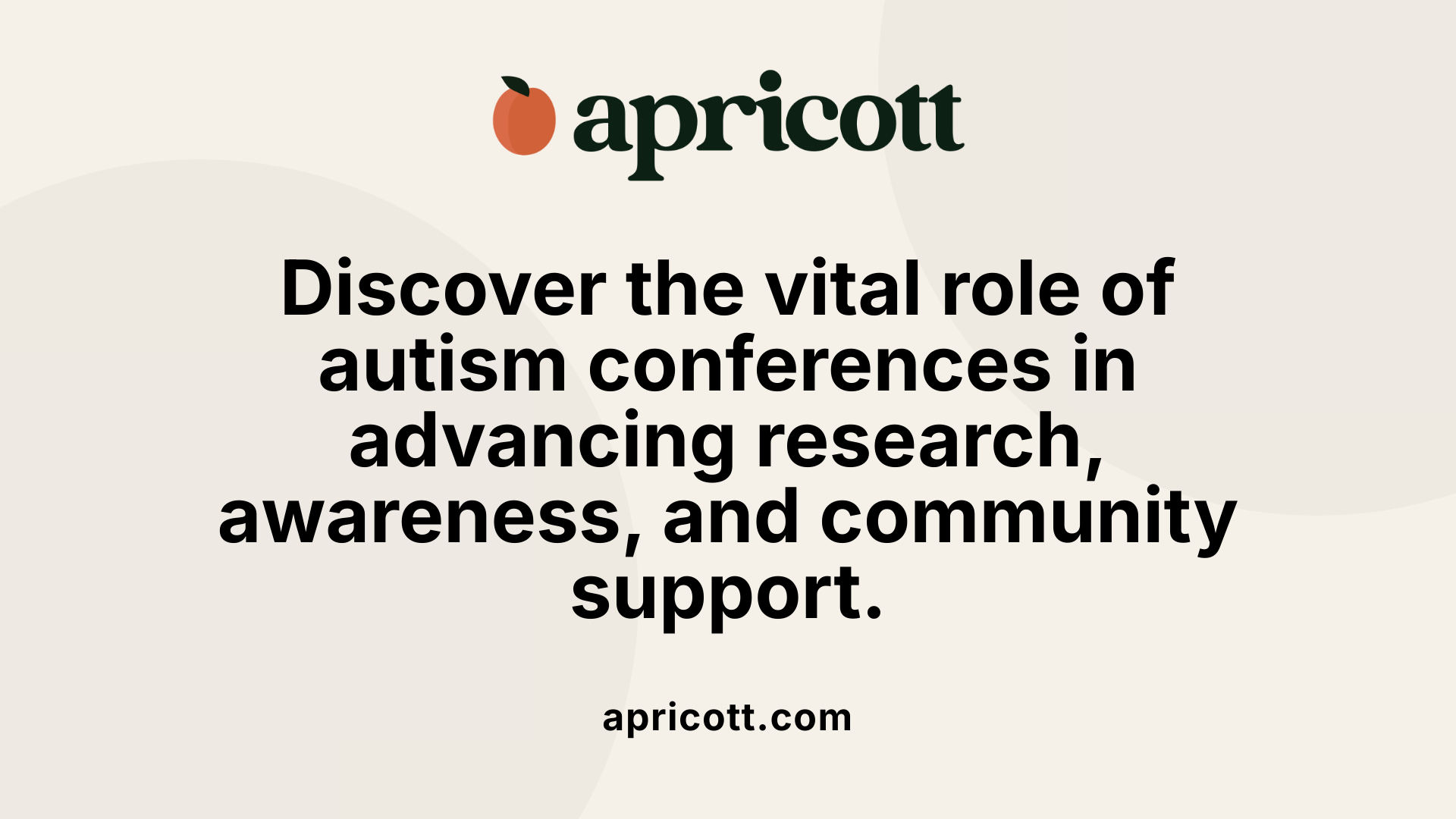 Autism conferences are essential gatherings that bring together researchers, clinicians, advocates, individuals with autism, and their families. They serve to promote a deeper understanding of autism spectrum disorder (ASD) through sharing the latest scientific research, innovative therapeutic methods, and practical support strategies.
Autism conferences are essential gatherings that bring together researchers, clinicians, advocates, individuals with autism, and their families. They serve to promote a deeper understanding of autism spectrum disorder (ASD) through sharing the latest scientific research, innovative therapeutic methods, and practical support strategies.
These events are vital for advancing knowledge and raising awareness about autism. They highlight important topics such as early detection, intervention techniques, social skills development, and supporting neurodivergent adults. By featuring keynote speakers, breakout sessions, and workshops, conferences serve as platforms for exchanging ideas and fostering collaboration among diverse stakeholders.
Community engagement and advocacy are central to autism conferences. They help challenge misconceptions, promote acceptance, and nurture inclusive practices within society. Attendees gain opportunities for professional development, which improve their ability to support individuals with autism effectively.
Additionally, autism conferences strengthen networks within the autism community, empowering families and advocates to participate actively in policy development and awareness campaigns. Overall, these gatherings are instrumental in driving progress, fostering a community of support, and shaping a more inclusive future for all individuals on the spectrum.
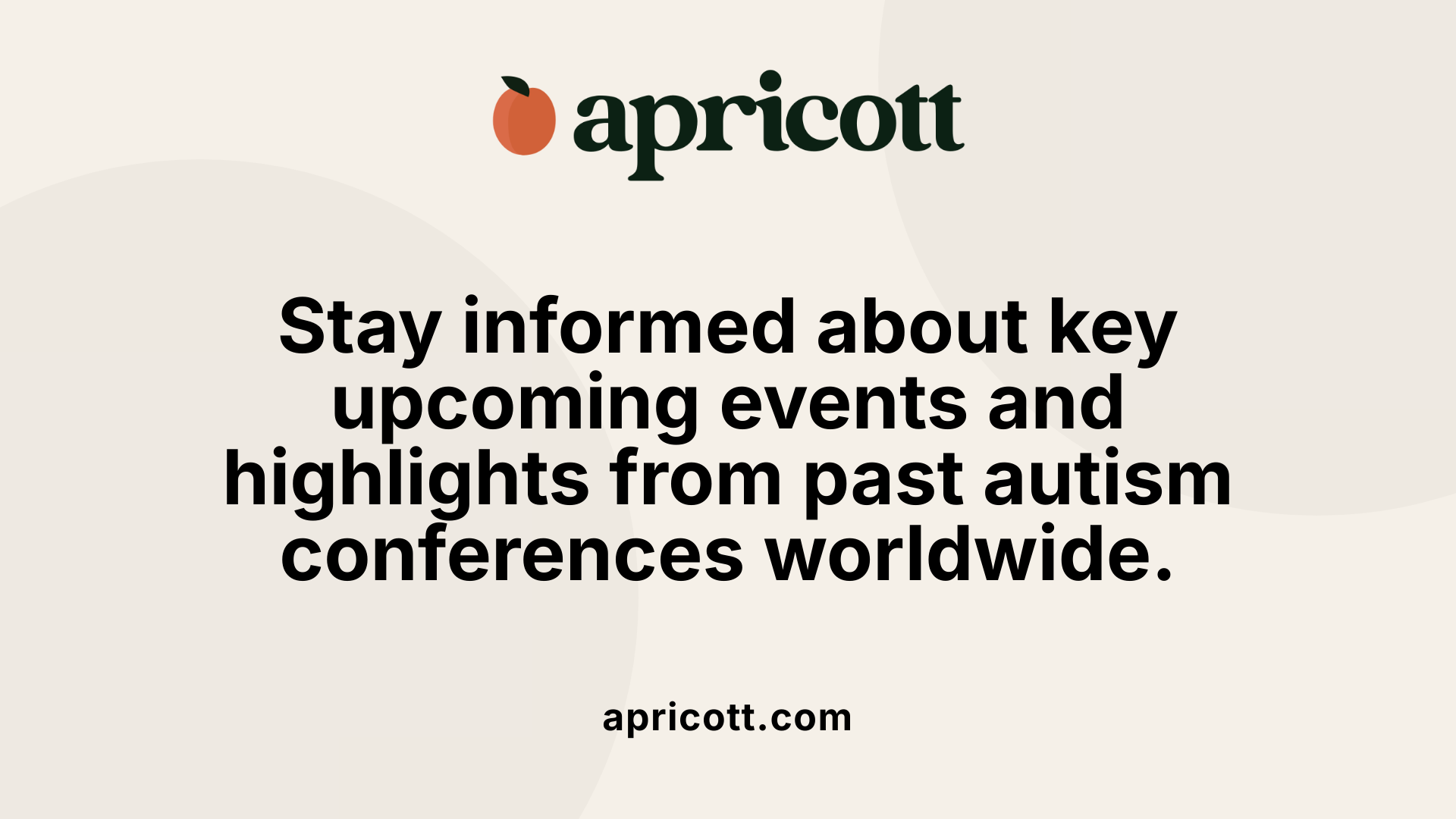 Several prominent autism conferences are scheduled for 2024 and 2025, offering a wide range of topics, networking opportunities, and keynote presentations. Notable upcoming events include the Profound Autism Summit on April 10-11, 2025, and the INSAR 2025 Annual Meeting from April 30 to May 3, 2025. Additionally, the Autism Conference & Expo of Georgia 2025 is set for May 28 at Georgia State University in Atlanta, with a theme emphasizing "Cultural Perspectives Leading to Impactful Practices." The event aims to facilitate resource sharing and support for individuals with autism and their families.
Several prominent autism conferences are scheduled for 2024 and 2025, offering a wide range of topics, networking opportunities, and keynote presentations. Notable upcoming events include the Profound Autism Summit on April 10-11, 2025, and the INSAR 2025 Annual Meeting from April 30 to May 3, 2025. Additionally, the Autism Conference & Expo of Georgia 2025 is set for May 28 at Georgia State University in Atlanta, with a theme emphasizing "Cultural Perspectives Leading to Impactful Practices." The event aims to facilitate resource sharing and support for individuals with autism and their families.
Looking further ahead, the 19th Annual Autism Conference is scheduled for January 17-19, 2025, in New Orleans, focused on "Empowering Through Evidence: Innovations and Advocacy in Autism." It features experts in autism research and behavior analysis, along with workshops and professional development sessions.
Past events have played a crucial role in disseminating knowledge and fostering community engagement. For example, the US Autism Association hosted sixteen World Autism Conferences between 2005 and 2018, including the 2010 event streamed live for a global audience. The World Autism Organisation and other organizations also contribute by sharing international research and practices.
Conferences are held in diverse locations across the US and worldwide. The UVU Autism Conference, Stanford Autism Center event, and the Oklahoma Autism Network conference highlight regional and specialized topics like addressing problem behaviors, promoting peer relationships, and supporting neurodivergent adults. Key speakers across these gatherings include Dr. Erik Carter, Dr. Greg Hanley, and Jessica Minahan, who bring cutting-edge insights to practitioners, families, and individuals.
To better understand the breadth of autism-focused events, the following table summarizes major upcoming and past conferences:
| Conference Name | Date | Location | Focus/Theme | Notable Speakers |
|---|---|---|---|---|
| Profound Autism Summit | Apr 10-11, 2025 | TBD | Profound autism support | TBD |
| INSAR Annual Meeting | Apr 30 - May 3, 2025 | TBD | Autism research advancements | Multiple research leaders |
| Autism Conference & Expo of Georgia 2025 | May 28, 2025 | Georgia State University | Cultural perspectives & practices | Mrs. Nasra Mirreh |
| 19th Autism Conference | Jan 17-19, 2025 | Sheraton New Orleans | Evidence-based practices | Various experts |
| UVU Autism Conference | 2025 | Utah Valley University | Best practices & innovations | Dr. Erik Carter & others |
| Oklahoma Autism Conference | Oct 2-3, 2025 | Oklahoma | Autism support across lifespan | Jessica Minahan |
This broad spectrum of conferences illustrates the ongoing commitment of organizations worldwide to advance understanding, treatment, and support for individuals with autism. From local to international levels, these events offer essential platforms for collaboration and learning.
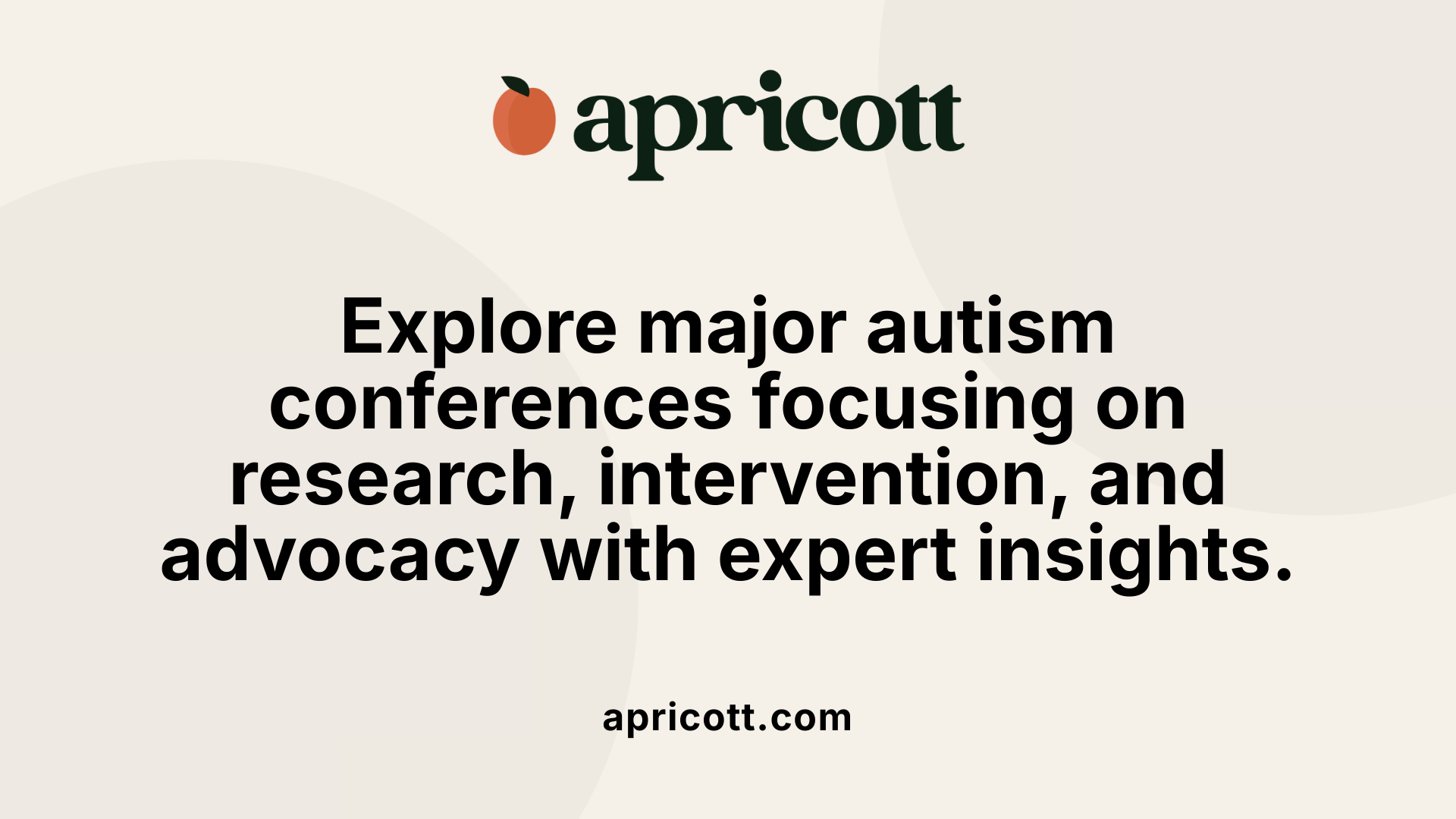 Several prominent autism conferences are held annually across various regions, each emphasizing research, intervention strategies, and advocacy efforts. Notable events include the INSAR Annual Meeting, which showcases the latest scientific advancements in autism research. Additionally, regional conferences such as the Autism Conference & Expo of Georgia and the Oklahoma Autism Conference focus on community-specific supports, inclusion, and acceptance, fostering local engagement.
Several prominent autism conferences are held annually across various regions, each emphasizing research, intervention strategies, and advocacy efforts. Notable events include the INSAR Annual Meeting, which showcases the latest scientific advancements in autism research. Additionally, regional conferences such as the Autism Conference & Expo of Georgia and the Oklahoma Autism Conference focus on community-specific supports, inclusion, and acceptance, fostering local engagement.
Main conferences in different regions often highlight themes like evidence-based practices, neurodiversity, trauma-informed care, and inclusive education. For instance, the 19th Annual Autism Conference in New Orleans centers on innovations and advocacy, emphasizing research-driven approaches and professional development. Similarly, the UVU Autism Conference stresses effective interventions, addressing problem behaviors, peer relationships, and promoting best practices in autism care.
These events frequently feature distinguished speakers whose contributions shape the field. Speakers like Dr. Erik Carter and Dr. Greg Hanley focus on intervention techniques and peer relationships, while professionals such as Jessica Minahan advocate for inclusive strategies and behavioral support. Their insights help guide practitioners, families, and educators in implementing effective and compassionate supports.
The overarching themes woven through these conferences include a strong emphasis on the 'four A's of autism'—Awareness, Acceptance, Appreciation, and Action. These principles serve as a foundation for fostering societal understanding, promoting inclusive environments, and translating research and advocacy into tangible supports. By aligning conference themes with these core values, the autism community continues to advance toward greater acceptance and empowerment for autistic individuals.
| Conference Name | Location | Focus Area | Notable Features |
|---|---|---|---|
| INSAR Annual Meeting | Global | Autism research | Latest research updates |
| Autism Conference & Expo of Georgia | Atlanta, GA | Community supports | Keynote by Mrs. Nasra Mirreh |
| Oklahoma Autism Conference | Raleigh, NC | Lifespan support | Focus on inclusion |
| UVU Autism Conference | Utah | Best practices | Keynotes by Dr. Erik Carter and Dr. Greg Hanley |
| 19th Annual Autism Conference | New Orleans, LA | Research and advocacy | Professional training |
These gatherings are instrumental in fostering a global and local dialogue about autism, promoting evidence-based practices, and honoring the diverse perspectives within the community.
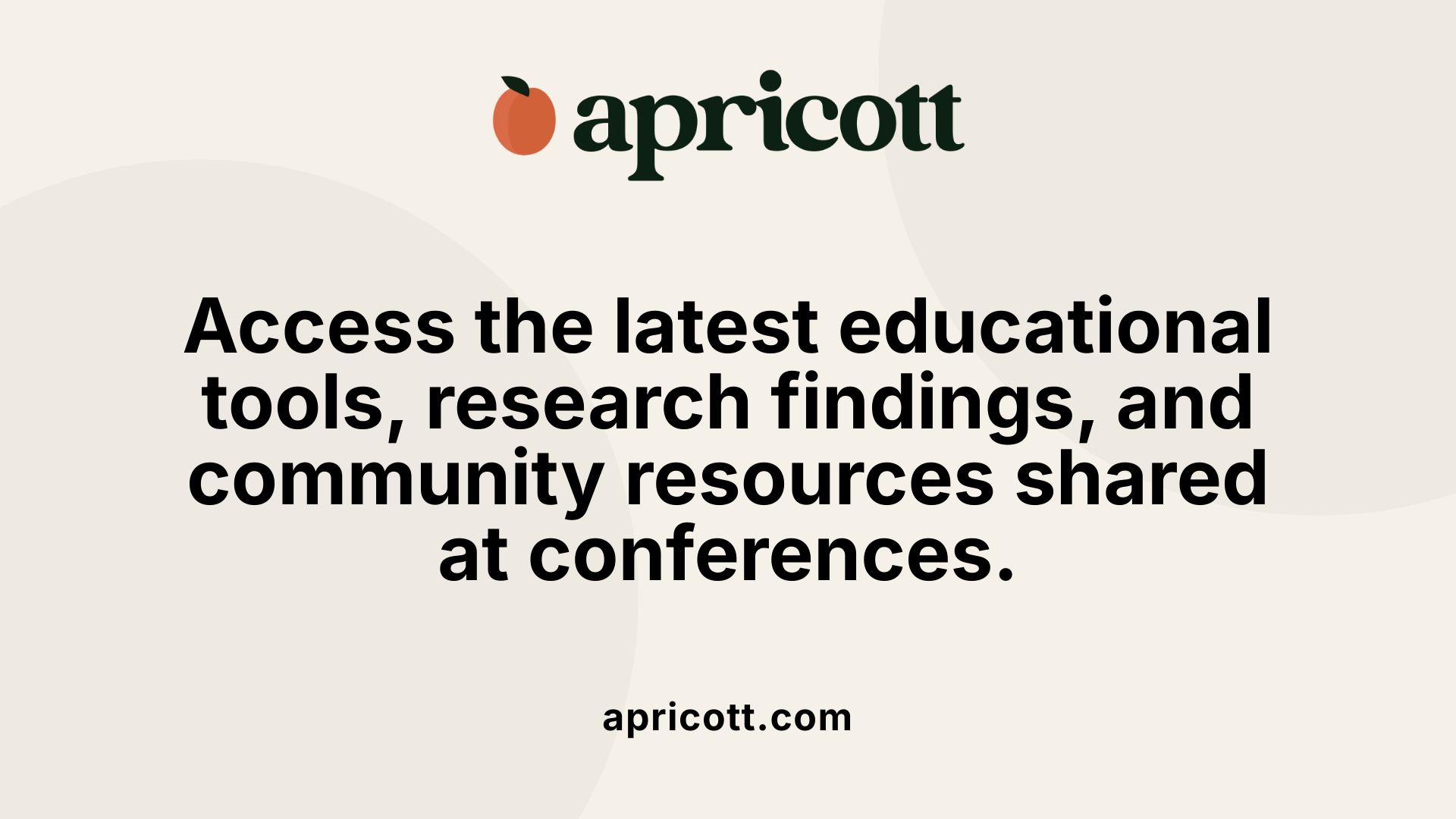 Autism-related conferences serve as vital platforms for sharing knowledge, resources, and best practices among professionals, families, and individuals with autism. These events often feature research presentations, keynote addresses, and workshops that highlight the latest in autism science and intervention strategies.
Autism-related conferences serve as vital platforms for sharing knowledge, resources, and best practices among professionals, families, and individuals with autism. These events often feature research presentations, keynote addresses, and workshops that highlight the latest in autism science and intervention strategies.
Many conferences include research-based sessions led by renowned experts. For example, keynote speakers like Dr. Judy S. Li and Dr. Zachary Warren present cutting-edge findings on autism assessment techniques, intervention models, and emerging biomedical approaches. Their addresses often focus on translating scientific discoveries into practical support strategies.
In addition to keynotes, scientific symposia cover diverse topics such as basic autism research, health services across different cultures, and multidisciplinary approaches to support. These sessions provide new insights into the biological underpinnings of autism, genetic research, and innovative therapeutic methods. The dissemination of this knowledge directly benefits practitioners and families seeking effective approaches.
Specialized conferences like the Purdue Autism Research Conference and the Advances in Autism Conference showcase advancements in precision therapeutics and genetic studies. They highlight efforts to develop personalized treatment options, addressing the unique needs of each individual. These events often feature research from leading institutions like the Seaver Autism Center, providing valuable data on genetic mutations, biological subtypes, and tailored intervention strategies.
Educational resources extend beyond research presentations. Conferences frequently offer workshops, training sessions, and resource fairs that focus on best practices, inclusive practices, and tools for enhancing support systems for families and professionals. Topics include behavioral interventions, communication strategies, and support for neurodiverse adults.
Support tools for families and professionals are also prominently featured. These encompass educational materials, community engagement resources, and technology solutions aimed at improving quality of life and fostering inclusive environments. Overall, autism conferences serve as essential hubs for accessing current research, educational tools, and innovative support strategies.
Summary Table of Autism Conference Resources
| Resource Type | Content Focus | Examples or Notable Speakers |
|---|---|---|
| Research Presentations | Latest scientific findings, biomedical advancements | Keynotes by Dr. Li and Dr. Warren, genetic research from Seaver Autism Center |
| Educational Resources | Best practices, intervention strategies | Workshops on behavioral therapy, communication tools, inclusive education |
| Support Tools | Family and professional resources | Technology aids, community support programs, resource fairs |
| Notable Conferences | Specific focus areas | Purdue Autism Research Conference, Advances in Autism Conference |
| Support Organizations | Global and local initiatives | Autism Society of North Carolina, World Autism Organisation |
Autism conferences remain central to advancing understanding, improving practices, and building supportive communities through these shared educational and resource-driven efforts.
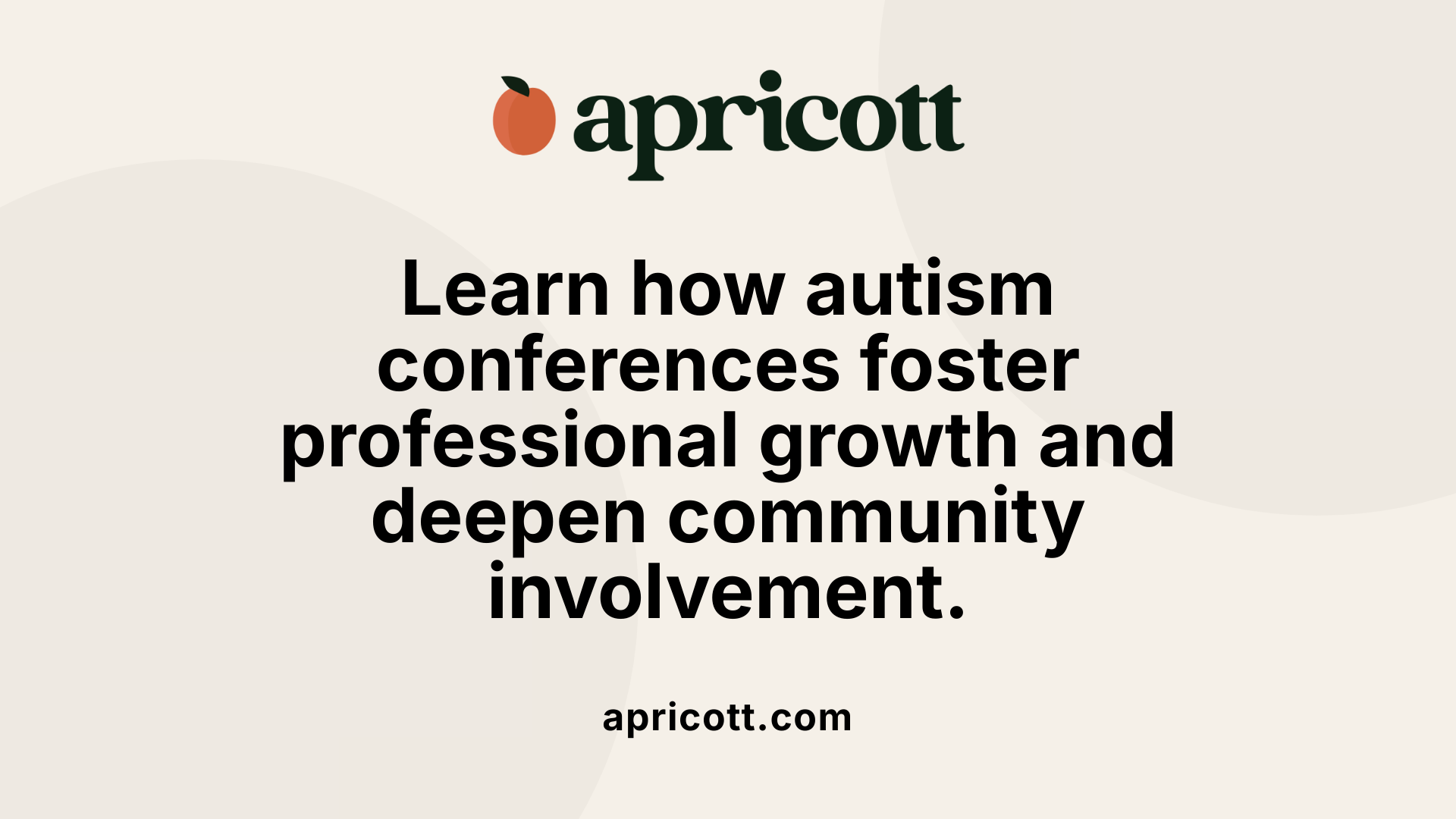
Autism conferences play a vital role in fostering both professional growth and community involvement. For professionals, these events offer a platform to stay updated with the latest research, evidence-based practices, and innovative strategies in autism care. Many conferences, such as the 19th Annual Autism Conference or the Stanford Autism Center event, provide opportunities to earn continuing education credits and certificates, enhancing practitioners’ skills and knowledge.
Community engagement is equally prioritized. Interactive sessions, workshops, and panel discussions encourage collaboration among professionals, families, and individuals with autism. Events like the Converge Autism Conference and the Autism Conference & Expo of Georgia highlight diverse voices, including those of autistic individuals and representatives from different cultural backgrounds. This inclusive approach promotes understanding, acceptance, and shared purpose.
Practical tools and strategies are shared to support communication, promote self-advocacy, and facilitate transitions across different life stages. Such knowledge directly empowers communities to provide better support and develop more inclusive environments.
Overall, autism conferences serve as hubs where education, resources, and networks intersect, driving advances in autism services, advocacy efforts, and community participation. They are essential for building a more informed, connected, and supportive autism community.
Autism conferences are more than mere gatherings; they are catalysts for change, innovation, and unity. They foster a global community committed to understanding autism, promoting best practices, and advocating for policies that support neurodiversity. With a focus on research, education, and community engagement, these conferences continue to evolve as vital platforms that inspire practitioners, empower families, and amplify the voices of autistic individuals. As awareness grows and acceptance deepens, autism conferences remain essential in shaping a future where everyone has the opportunity to thrive.